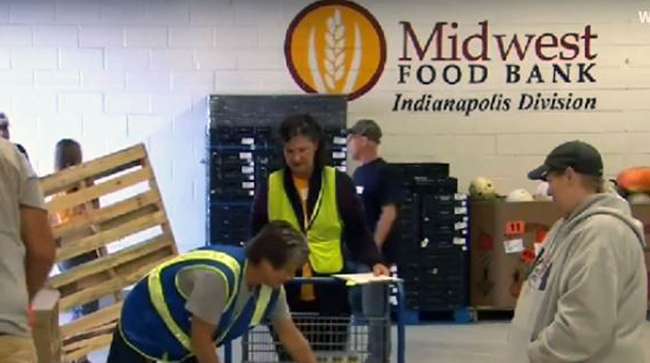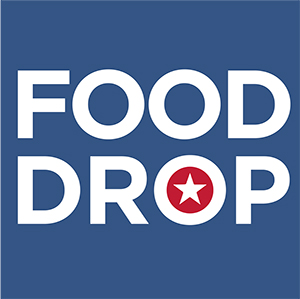Staff Reporter
Truckers Help Fight Hunger in Indiana With Food Drop Program

Truckers moving through Indiana are combating hunger across the state through a program that allows them to donate loads of food that have been rejected by stores.
Food Drop, an initiative created by the Indy Hunger Network, connects truckers and logistics firms with food banks that will take rejected loads off drivers’ hands. Food Drop started as a pilot program in Indianapolis in 2017. After the pilot’s success, in which 87,000 pounds of food were salvaged during the five-month run, the program was expanded to encompass the entire state. Food Drop now sustains nine locations, with four in Indianapolis.

Food sometimes is turned away when it reaches its destination even if it’s suitable to eat. Truckers are then faced with the options of dumping the food and incurring landfill fees, reselling the food or finding a way to donate it. Food Drop provides drivers with the location, hours and contact information of nine food banks. The relief agencies help unload the truck and provide the drivers with a tax-deductible receipt for their donations.
“Of course, no one wants to see food go to waste, but the problem is a lot of the time the food is ending up in the trash because it can be really hard to find a place to donate it, especially when you’re trying to get back on the road and keep to a schedule,” Indy Hunger Network spokeswoman Alex Sindorf said.
Food can be rejected for a number of reasons, ranging from logistical mix-ups to cosmetic flaws. Sometimes a store won’t accept a load in which a pallet has damaged the top layer of food. Sindorf said that a store deemed one truckload of bananas unacceptable because the fruit was slightly too ripe.
On the whole, 40% of the food that is grown in the United States is wasted somewhere along the supply chain as it moves from farm to consumer, according to Sindorf. She estimated that 2-5% of food loads are rejected at stores.
Food Drop began as a pilot program, aimed at redirecting truckloads of rejected food away from landfills and into the hands of hungry residents. In the first year, 87,000 lbs were donated to four participating Indy service providers. pic.twitter.com/2sHc2w4spV — Mayor Joe Hogsett (@IndyMayorJoe) October 23, 2018
The Indiana Motor Truck Association, which has been involved in Food Drop since its pilot stage, surveyed drivers to learn what they do when their load is rejected. All the respondents said their first move is to locate a food pantry rather than call the dump.
“It is not in a truck driver’s nature to want to call a landfill and dump good food. You hate to dispose of product that could feed people,” IMTA Vice President Barbara Hunt said. “When they have a full load of food that’s perfectly good to eat but gets rejected, their first objective is to try to figure out how to get that load off of their trailer so that they can keep moving and keep making money.”

Hunt
Drivers should be able to complete “food rescue” deliveries without running afoul of their hours-of-service limits, according to leaders involved in Food Drop. John Whitaker, executive director of the Midwest Food Bank, said that drivers usually get in and out of his food bank in 15 to 20 minutes. The Midwest Food Bank has 10 locations worldwide, one of which is in Indianapolis and included in the Food Drop program.
Sindorf pointed out that many food banks are close to major highways and easily accessible to most drivers. Jeremy Baynai, operations manager of the Midwest Food Bank, said many drivers moving through Indiana pass through Indianapolis and should be able to contact one of the city’s food banks listed on Food Drop. IMTA estimates that 1 million trucks move through Indiana each day.
Whitaker said drivers are pleased to donate food rather than dump it because it is more cost-effective — not to mention socially responsible. Baynai said he encountered one driver who had spent three days calling different centers in an attempt to off-load two pallets of coffee creamer so he didn’t have to throw it out.
“They’re ecstatic [to donate] because some of them have been in town for two or three days,” Whitaker said.
Twenty eight pallets or 26,000 lbs. of fresh spinach, romaine lettuce & broccoli stems were distributed to hungry... Posted by Indiana Motor Truck Association on Thursday, October 26, 2017
Hunger is an important issue in Indiana. Sindorf said that one in six Indiana residents are food insecure, which means they rely on food banks and food pantries. She said that most of the donations are dairy products and fresh produce.
“The healthier people are, the healthier our community’s going to be,” Sindorf said. “A lot of foods are fresh produce or dairy products, and those are the things so many people in our state can’t afford to buy.”
Baynai said Food Drop is unique because it’s the only program he has come across that is devoted to truckers. Sindorf said there have been conversations to run the program in other states, although an expansion plan has yet to materialize.

